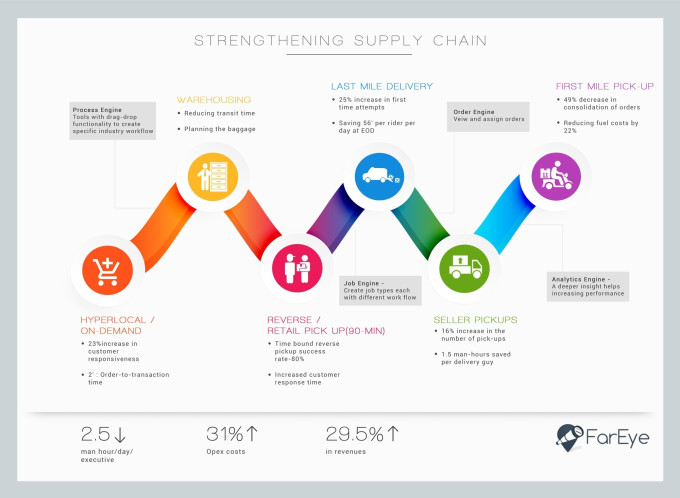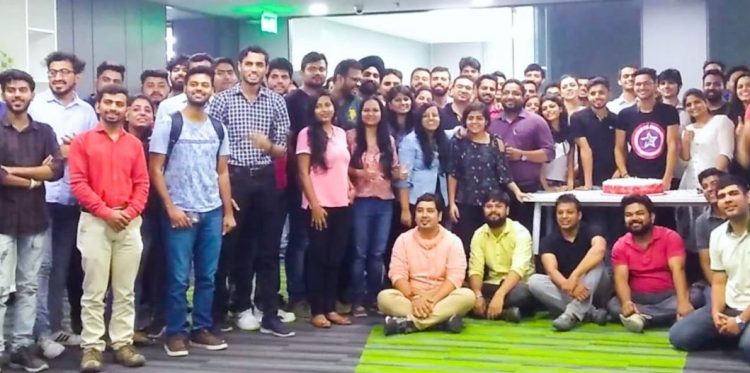Watch all the Transform 2020 sessions on-demand here.
FarEye, a startup developing a predictive transportation logistics platform, today announced that it raised $25 million in equity financing. The new tranche comes as global supply chains become strained by demand related to COVID-19; earlier this week, to combat overcapacity, Amazon imposed a cap on grocery delivery and pickup customers.
FarEye asserts that its software-as-a-service (SaaS) solution can anticipate and respond to influxes in demand in real time, improving the purchasing and selling experience. The company claims to eliminate 55% of risks like theft and pilferage and to reduce delivery turnaround, loading, transit, and unloading time by 25% to 32%.
FarEye’s Java-based, Microsoft Azure-backed Serve platform enables the company’s over 150 clients — among them Domino’s, Walmart, Amway, 7-Eleven, and DHL — to orchestrate and track logistics operations with automatic dispatching and order allocation, electronic proof of delivery, customer-facing apps, and other such tools. Serve anticipates delays and handles exceptions, while at the same time optimizing delivery routes to reduce miles per delivery and boost fleet productivity, taking into account things like traffic, weather, and detours. Machine learning algorithms use data from past pickup and delivery attempts to improve future estimates, and over a billion customers’ addresses are geocoded to boost successful first-attempt delivery rates.
Additionally, Serve provides delivery progress reports and a drag-and-drop, single-touch interface that lets managers update customer preferences on the fly, alongside an AI-powered chat platform that plugs into existing systems to expedite customer inquiry resolutions. According to CEO Kushal Nahata, the platform handles over 10 million transactions per day for couriers, retailers, manufacturers, grocers, and others.
June 5th: The AI Audit in NYC
Join us next week in NYC to engage with top executive leaders, delving into strategies for auditing AI models to ensure fairness, optimal performance, and ethical compliance across diverse organizations. Secure your attendance for this exclusive invite-only event.

To aid more directly in the fight against COVID-19, FarEye recently began offering select products at no charge until June 2020 to customers handling daily essential item deliveries. Hospital sites and non-governmental organizations can access those same tools for free until September.
This latest investment in Noida, India-based FarEye (a series D) was led by M12, Microsoft’s corporate venture fund, with participation from Eight Roads Ventures, Honeywell Ventures, and existing investor SAIF Partners. It brings the total venture capital raised by the company, which has over 350 employees (and plans to grow that workforce to 500 by 2021), to nearly $60 million following an approximately $7.9 million series C in February 2018.
FarEye competes with startups like SourceDay and Flock Freight in the global logistics space, which is anticipated to be worth $15.5 trillion by 2023. Uber offers a service called Uber Freight, to which it recently committed another $200 million as part of a major expansion. San Francisco-based startup KeepTruckin last year secured $149 million to further develop its shipment marketplace, and Next Trucking closed a $97 million investment. For its part, Convoy raised $400 million at a $2.75 billion valuation to make freight trucking more efficient.
But FarEye has an advantage in that it has been profitable “since day one,” according to Nahata — it makes money by charging a license fee and transaction fees, as well as for vertical-specific services. He said the company “will use this investment to create greater value and improve the experience for our customers by enhancing the platform’s predictive capabilities, increasing platform partnerships, expanding into new markets and growing our teams” in Europe, Asia, and the U.S.


